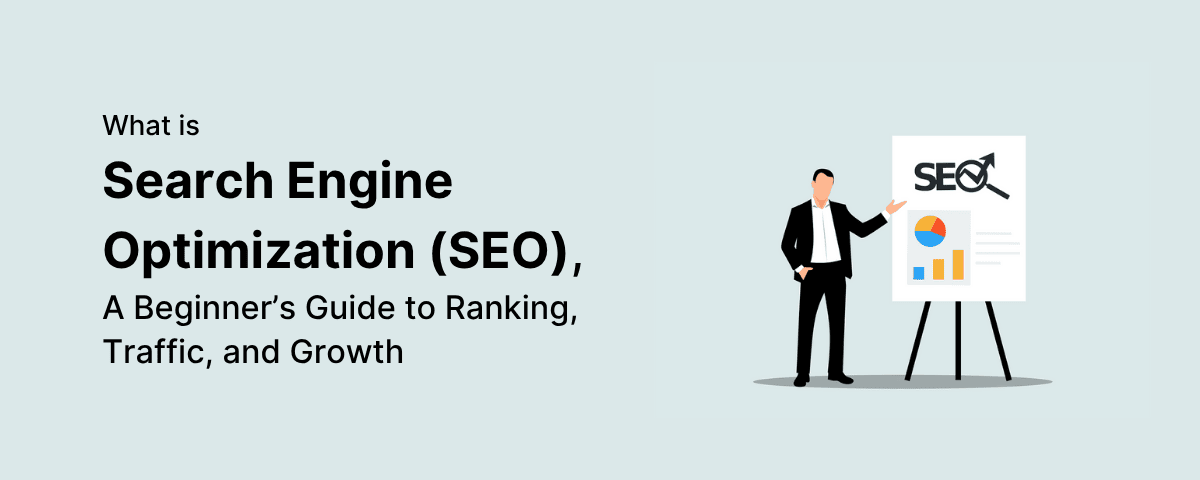- Instagram Marketing Strategy 2025: Tips, Tools & Growth - September 3, 2025
- Facebook Marketing Guide 2025: Strategies to Boost ROI - September 3, 2025
- How to Do an SEO Audit in 2025: Step-by-Step Guide - September 3, 2025
You’ve spent months building your website. It looks great. It tells your story. But there’s just one problem, no one’s visiting. It’s like setting up a beautiful shop in the middle of the desert. No signs. No map. No foot traffic. That’s what the internet feels like without SEO.
Here’s the truth: Over half of all website visits come from organic search. Not ads. Not social. Just people typing questions into Google. If your site doesn’t show up, you’re invisible. That’s why understanding how search engines work, and what SEO actually is, isn’t optional anymore. It’s the foundation of being found online.
Contents
- So, What Is SEO?
- Why SEO Isn’t Just Techy Stuff
- How Do Search Engines Actually Work?
- SEO vs SEM: What’s the Real Difference?
- SEO vs. PPC: The Long Game vs. The Fast Lane
- Why SEO Really Matters
- The 4 Main Types of SEO (And Why You Need All of Them)
- Technical SEO: Why the Backend Matters
- On-Page SEO: Where Content Meets Search
- Off-Page SEO: Building Trust Beyond Your Site
- Brand Authority: Why SEO Is More Than Just Rankings
- Keyword Research: The Backbone of Every SEO Win
- Planning an SEO Strategy That Actually Works
- Creating Content That Actually Helps (and Ranks)
- Website Structure: Make It Easy to Navigate and Rank
- User Experience (UX): The Overlooked Ranking Factor
- Tracking Your SEO Performance
- SEO Tools That Make Tracking and Growth Easier
- Staying Ahead of Google’s Algorithm Updates
- Local SEO: Be Found Where It Matters Most
- Going Global: How to Approach International SEO
- SEO Mistakes to Avoid (If You Want to Rank)
- How AI and Automation Are Changing SEO
- Learning SEO: How to Build Skills That Stick
- When It’s Time to Hire an SEO Agency
- The Future of SEO: Where It’s Headed Next
- Final Thoughts: Why SEO Is Still Your Best Growth Bet
So, What Is SEO?
Let’s cut through the jargon. Search Engine Optimization (SEO) is about helping your website appear in the right place at the right time: on the first page of Google when someone’s looking for what you offer.
It’s not just about traffic, it’s about the right traffic. When someone types “best CRM for small businesses” or “organic dog treats near me,” SEO makes sure your content shows up, earns trust, and gets clicks without you paying for every visitor.
By focusing on organic search, you’re tapping into the 53% of total website traffic that comes from unpaid results. That means real people who are actually searching for your solution, no ad spend required.
Why SEO Isn’t Just Techy Stuff
Let’s be real, SEO can sound intimidating. Meta tags, alt text, domain authority? Yeah, it can get technical. But underneath it all, SEO is about showing up when someone needs you. It’s part strategy, part storytelling, and part technical hygiene. And when done right, it builds long-term credibility that no PPC ad can buy.
At Hiigher, we’ve helped brands and agencies get serious about growth by anchoring their digital strategy in SEO. From eCommerce to SaaS to wellness and education, we focus on measurable visibility, not vanity metrics.
So, if you’re wondering whether SEO is worth your time? The answer is yes, because it’s how people find you.
How Do Search Engines Actually Work?
Let’s simplify this. Search engines like Google work like librarians for the internet. They constantly scan, sort, and decide what content to show when someone types a search.
Here’s the behind-the-scenes process:
- Crawling – Bots (called spiders) browse the web, jumping from link to link, collecting data on every page they find.
- Rendering – They check how your site looks and functions for users.
- Indexing – Your content is analyzed and stored in a massive database.
- Ranking – Algorithms decide where your pages land in the results based on relevance, quality, speed, authority, and dozens of other signals.
If your site isn’t being crawled or indexed properly, or if the content doesn’t match what people are searching for, you won’t show up, no matter how good your design looks.
At Hiigher, we bake this crawl-to-rank process into every campaign. Real-time analytics + search behavior + creative execution = visibility that drives revenue.
SEO vs SEM: What’s the Real Difference?
You’ve probably heard both terms: SEO and SEM. They sound similar, but they’re not the same thing.
Here’s a simple way to think about it:
- SEO is about earning visibility organically. No ads. Just smart strategy and good content.
- SEM (Search Engine Marketing) includes both SEO and paid tactics like Google Ads (PPC).
Let’s break it down:
| Strategy | Cost | Traffic Source |
| SEO | No direct cost | Organic |
| SEM | Paid + organic | Paid + organic |
| PPC | Paid | Paid |
SEM can give you instant results, but SEO builds long-term trust. And when you combine both? That’s when you scale fast, and smart.
That’s exactly how we do it at Hiigher. Our performance-led campaigns often pair SEO foundations with strategic paid support to help clients dominate both the short and long game.
At Hiigher, we believe SEO should be strategic, creative, and revenue-focused, not isolated from your broader digital marketing strategy.
🚀 Want to see where your site stands?
Get a free SEO audit from Hiigher and uncover opportunities to grow your traffic the smart way.
[Request My Free Audit]
SEO vs. PPC: The Long Game vs. The Fast Lane
Both SEO and PPC (pay-per-click ads) help your website get seen in search results. But they work in completely different ways.
With SEO, you’re playing the long game. You build authority and rank by creating helpful content, earning backlinks, and improving your site’s structure. It takes time, but the payoff lasts. Once your pages rank, they keep bringing in traffic without you paying for every click.
PPC, on the other hand, is like flipping on a light switch. You get instant visibility by paying for top spots in search results. Great for launches, time-sensitive promos, or filling a pipeline quickly. But the moment you stop paying? The lights go out.
Let’s compare:
- SEO = Long-term growth and credibility
- PPC = Short-term wins with a budget
- SEO = Builds trust over time
- PPC = Lets you target exact audiences fast
The sweet spot? Use both strategically. At Hiigher, we help brands get the best of both, solid SEO to own search long-term, plus PPC to capture quick wins and high-intent traffic.
Why SEO Really Matters
Let’s zoom out.
Most people click on organic search results, not ads. In fact, 70% of searchers skip past sponsored listings and go straight to the real stuff.
Why? Because SEO builds trust. It tells your audience, “We’re not just paying to be here, we earned it.”
And that trust pays off:
- 53% of all website visits come from organic traffic
- 87% of people research online before buying
- Top-ranking sites get the lion’s share of clicks (and customers)
If you’re not showing up when someone searches for your product, service, or industry, you’re leaving money on the table.
At Hiigher, we help brands move from invisible to unforgettable by making SEO the backbone of their digital strategy. It’s how we help clients grow without blowing their ad budgets.
The 4 Main Types of SEO (And Why You Need All of Them)
If you want your site to rank, and stay ranked, you can’t just focus on one part of SEO. It’s like trying to win a race with one tire.
Here are the four pillars that hold up a strong SEO strategy:
- On-Page SEO – This is all about what’s on your site. Content, headlines, keywords, meta descriptions. It’s what search engines (and humans) read.
- Off-Page SEO – What happens off your site, like backlinks and social signals. Think of it as online reputation-building.
- Technical SEO – The under-the-hood stuff: site speed, mobile-friendliness, secure connections (HTTPS), and structured data.
- Local SEO – Optimizing your site for people searching in your geographic area. Super important if you’re a local business.
<blockquote>“Understanding the four types of SEO helps you build a site that ranks well and earns trust with both users and search engines.”</blockquote>
At Hiigher, we don’t just check one of these boxes. We handle them all, because real SEO results don’t come from piecemeal tactics. They come from a complete, strategy-first approach.
Technical SEO: Why the Backend Matters
You could have the best content in the world, but if your site is slow or hard to navigate, Google’s not going to rank you.
That’s where technical SEO comes in. It’s all about making sure search engines can crawl, index, and understand your site.
Here’s what really matters:
- Site speed – If your pages take too long to load, people bounce, and rankings drop.
- Mobile-friendliness – With most traffic now coming from phones, your site has to work beautifully on all devices.
- HTTPS security – Google favors secure sites, and so do users.
- Structured data – Helps search engines understand your content (and can earn you rich snippets in search).
We’ve seen firsthand at Hiigher how cleaning up technical SEO can lead to major ranking jumps, sometimes within days. We include this as part of every SEO audit and campaign because the backend is what makes the front end work.
On-Page SEO: Where Content Meets Search
On-page SEO is where strategy meets storytelling. This is the part of SEO most people recognize, tweaking keywords, writing better titles, and making your content shine. But it’s more than just stuffing keywords into a paragraph.
Here’s what matters most:
- Title tags and meta descriptions that make people want to click.
- Keywords used naturally throughout your content, not forced.
- Internal linking to guide readers (and bots) through your site.
- Clear structure with headings, short paragraphs, and mobile-friendly formatting.
And most importantly? Content that’s actually useful. If your blog post doesn’t answer the reader’s question or solve their problem, no amount of optimization will save it.
At Hiigher, we help brands create content that does both: ranks well and resonates with real people. Our secret? Deep keyword research + a clear understanding of search intent + sharp copy that gets to the point.
<blockquote>“High-quality content, smart keyword use, and helpful links are what turn an average page into a top-ranking one.”</blockquote>
Off-Page SEO: Building Trust Beyond Your Site
Now let’s talk about what happens off your website, because that matters, too.
Off-page SEO is all about building your authority in the eyes of search engines. It shows Google that other people vouch for you. And how do you do that? With backlinks.
A backlink is simply another site linking to yours. But not all backlinks are equal. One link from a credible, relevant site can do more for your rankings than dozens from random blogs.
Here are some proven off-page strategies:
- Guest posting on industry sites
- Creating content that people want to share
- Partnering with brands for cross-promotion
- Building relationships (real ones!) in your niche
At Hiigher, we take link building seriously, no shady shortcuts, just smart, ethical outreach that earns real links from real websites.
Brand Authority: Why SEO Is More Than Just Rankings
Ranking is nice. But building authority? That’s how you stay ranked.
When your brand becomes a trusted voice in your space, search engines notice. They reward consistent, credible content, and so do your customers.
Here’s how to build brand authority through SEO:
- Publish content that solves real problems
- Get featured on high-quality websites
- Show up consistently in local and niche searches
- Engage your audience on social platforms
This is what we specialize in at Hiigher. We help you grow not just traffic, but trust. And that’s what really moves the needle.
Keyword Research: The Backbone of Every SEO Win
If SEO is the engine, keywords are the fuel. But not just any keywords, the right ones.
Keyword research is more than pulling a list from a tool. It’s about figuring out how your audience talks, what they search for, and what they’re trying to find. When you align your content with that intent, that’s when rankings (and conversions) happen.
Here’s how to do it right:
- Use tools like SEMrush, Moz, or Ahrefs to spot keyword volume and competition.
- Focus on long-tail keywords, they’re more specific and less competitive.
- Always ask: What is the searcher really trying to do?
- Look at your competitors’ keywords, what are they ranking for that you’re missing?
At Hiigher, keyword research is the first step of every SEO project. We use it to map out your content, identify ranking gaps, and make sure your site targets high-intent queries that actually lead to business.
Planning an SEO Strategy That Actually Works
SEO without a plan is like trying to run a marathon in flip-flops. You need structure, goals, and a clear path forward.
Here’s our go-to framework for building SEO strategies that deliver:
- Start with clear goals. Are you trying to rank for product keywords? Build thought leadership? Dominate your local market?
- Audit your site. Identify what’s working and what’s holding you back (technical issues, thin content, poor keyword targeting).
- Build a content roadmap. What will you publish, and when? What questions do your customers have?
- Track and adjust. Use data to guide your decisions. SEO is never “set it and forget it.”
With Hiigher, strategy comes first, always. Because pretty websites and clever copy mean nothing if they’re not helping your audience find you and trust you.
Creating Content That Actually Helps (and Ranks)
Great SEO content doesn’t just repeat keywords, it answers questions, solves problems, and builds trust.
To hit that sweet spot between human and algorithm, follow these rules:
- Write for humans first. Keep it conversational and clear.
- Use headings, short paragraphs, and visual cues to keep things scannable.
- Naturally include keywords where they fit, never force them.
- Keep content fresh. Update old posts to stay relevant.
- Include stats, examples, and links to boost credibility.
At Hiigher, we don’t just create blog posts. We craft content systems built to rank, convert, and scale. Our team blends SEO data with creative storytelling to help brands show up, and stand out.
Website Structure: Make It Easy to Navigate and Rank
Ever visited a website and immediately felt lost? That’s a sign of poor structure, and search engines hate it just as much as users do.
A clean, logical site structure helps Google crawl your pages more efficiently, which means faster indexing and better rankings. It also keeps visitors engaged because they can easily find what they’re looking for.
Here’s what a strong structure looks like:
- Clear hierarchy – Organize pages by themes (e.g., Homepage > Services > SEO > Local SEO).
- Descriptive URLs – Use URLs like /seo/local instead of /page123?id=7.
- Internal links – Connect related pages to guide users and pass page authority.
- Avoid broken links – They frustrate users and hurt SEO.
At Hiigher, we treat site architecture as part of your SEO engine, not an afterthought. Clean design + smart structure = better rankings and a better experience.
User Experience (UX): The Overlooked Ranking Factor
You could have the best SEO strategy in the world, but if your site is slow or clunky? People will bounce. Fast.
Google’s algorithms now factor Core Web Vitals into rankings. That means your site needs to load fast, respond quickly, and stay visually stable, especially on mobile.
Here’s how UX impacts SEO:
| UX Factor | What Users Feel | SEO Impact |
| Slow load speed | Frustration, impatience | Higher bounce rate |
| Poor mobile design | Annoyance, disinterest | Lower mobile rankings |
| Confusing layout | Distrust, confusion | Shorter time on site |
| No HTTPS | Hesitation, insecurity | Ranking penalty |
Hiigher’s design and dev team bakes SEO and UX together from day one. Because you shouldn’t have to choose between beautiful and fast, you need both to win online.
Tracking Your SEO Performance
Once your SEO is in motion, how do you know if it’s actually working? You track it.
The best SEO strategies are built on data. When you monitor performance regularly, you can catch issues early and double down on what’s driving results.
Here’s what we track at Hiigher:
- Organic traffic – Are more people finding your site via search?
- Keyword rankings – Are your target terms moving up?
- Conversion rates – Are visitors taking action?
- Bounce rates – Are people sticking around or bouncing right away?
We don’t just throw you a report. We walk you through what’s happening, why it matters, and what to do next. Because SEO isn’t one-size-fits-all, it’s a living, breathing system that evolves.
SEO Tools That Make Tracking and Growth Easier
You don’t have to guess your way through SEO. With the right tools, you can track performance, spot problems early, and make smart decisions.
Here are a few we use at Hiigher (and recommend to our clients):
- Google Analytics – Tracks who visits your site, how they got there, and what they do once they arrive.
- Google Search Console – Shows how your site performs in search results and flags technical issues.
- SEMrush / Moz / Ahrefs – Great for keyword research, backlink tracking, and competitor insights.
- Ahrefs – Especially strong for finding link-building opportunities and analyzing site authority.
When paired with a clear strategy, these tools do more than collect data, they guide decisions, highlight growth opportunities, and keep your SEO moving forward.
Staying Ahead of Google’s Algorithm Updates
Google’s algorithm changes more than you think, sometimes multiple times a day. While most updates are minor, big ones like BERT or MUM can completely shift the playing field.
So, how do you protect your rankings?
- Stay informed. Follow Google’s Search Central blog or trusted SEO news sources.
- Stick to best practices. High-quality content, technical optimization, and ethical tactics always survive updates.
- Analyze traffic shifts. If you notice a sudden drop, check if there’s been an update.
- Stay flexible. Be ready to tweak your strategy based on what the data tells you.
At Hiigher, we build SEO campaigns to weather algorithm storms. No shortcuts. No spammy tactics. Just proven, sustainable strategies that keep working, no matter what Google throws your way.
Local SEO: Be Found Where It Matters Most
If you’re a business that serves a specific city, town, or region, local SEO should be front and center.
Here’s what it helps you do:
- Show up in Google Maps and “near me” searches
- Attract nearby customers who are ready to buy
- Build trust through customer reviews and accurate listings
Start with this checklist:
- Claim your Google Business Profile (formerly Google My Business).
- Add local keywords (like “SEO agency in Austin”) to your site’s content and metadata.
- Get listed in local directories like Yelp, BBB, or industry-specific hubs.
- Encourage customer reviews, they build trust and boost visibility.
We’ve helped dozens of service-area businesses at Hiigher turn local SEO into a lead machine. Whether you’re a fitness studio, dental clinic, or SaaS company targeting a metro area, we help you get found by the people who matter most, your neighbors.
Going Global: How to Approach International SEO
Expanding your reach beyond borders? International SEO makes sure you’re showing up in the right country, language, and context.
But it’s more than just translating your content. You need to understand how people search in each region, because it varies wildly from one country to another.
Here’s how to get international SEO right:
- Use country-code domains (like .co.uk or .fr) when it makes sense.
- Implement hreflang tags to signal different language versions of your site.
- Host content locally if speed matters in that region.
- Research local keyword trends (don’t assume everyone searches like Americans).
We’ve helped clients at Hiigher expand into Canada, Europe, and Asia using geo-specific SEO strategies. The key? Respecting cultural differences and building SEO campaigns tailored to the way people actually search in each market.
SEO Mistakes to Avoid (If You Want to Rank)
Even with the best intentions, it’s easy to make missteps that sabotage your SEO. Here are some of the most common we see (and fix) at Hiigher:
- Skipping keyword research – You end up targeting terms no one’s searching.
- Ignoring mobile users – More than half of traffic is mobile. If your site doesn’t work on phones, you’re toast.
- Forgetting meta titles and descriptions – These are your ad copy in search results. Make them count.
- Overloading on keywords – Keyword stuffing = red flag for Google.
- Neglecting site speed – Slow sites kill rankings and user experience.
- Using shady tactics – If it feels sketchy, it probably is (and it won’t last).
SEO isn’t about tricking the system. It’s about helping search engines (and people) find what they need. Simple, honest, strategic work always wins.
How AI and Automation Are Changing SEO
AI isn’t just reshaping how search engines work, it’s also transforming how we do SEO.
Here’s what AI and automation tools are doing behind the scenes:
- Speeding up keyword research with smarter suggestions
- Improving content creation through AI-generated drafts (that still need a human touch)
- Automating site audits to catch technical issues faster
- Predicting trends so you can stay ahead of what people will search next
At Hiigher, we use AI-enhanced tools to work smarter, not just faster. But we never let robots run the show. Every piece of content, every strategy, every audit gets human oversight.
Because while AI can assist, it can’t replace experience, empathy, or knowing what actually moves the needle.
Learning SEO: How to Build Skills That Stick
If you’re curious about doing SEO yourself, you’re in luck. There are more resources now than ever to help you learn, from beginner-friendly courses to advanced tactical playbooks.
Here’s where to start:
- Google Search Central – Free, official SEO documentation straight from Google.
- Moz Beginner’s Guide to SEO – A solid overview with easy explanations.
- SEMrush Academy / Ahrefs YouTube – Great for tutorials, tools, and walkthroughs.
- Coursera & Udemy – Structured courses (some free, others low-cost).
- HubSpot Academy – SEO certification programs ideal for marketers.
Pro tip: Learning SEO is one thing. Keeping up with the changes? That’s the real game. SEO is constantly evolving, so build a habit of reading blogs, joining communities, and staying curious.
When It’s Time to Hire an SEO Agency
You can DIY a lot of SEO. But when growth stalls, your time is limited, or the technical stuff gets overwhelming, it’s time to call in the pros.
Here’s how to know if you need an agency:
- You’re not ranking for your key terms, despite your efforts
- You want to grow fast but can’t keep up with SEO demands
- You need content, technical fixes, and backlinks, but don’t have the bandwidth
- You’re launching a new site or entering a new market
At Hiigher, we don’t just “do SEO.” We act as an extension of your growth team. From keyword research to site audits to full-scale execution across paid, organic, and white-label, our strategies are built to deliver results, not vanity metrics.
We’re trusted by fast-growing agencies and brands across eCommerce, SaaS, wellness, and education, and we’re here to help you grow, too.
The Future of SEO: Where It’s Headed Next
Search is changing faster than ever. But don’t worry, here’s what to watch:
- Voice search is rising. People are searching the way they talk, not type.
- AI is everywhere, in how content is created, and how it’s ranked.
- Core Web Vitals are here to stay. Site speed, interactivity, and layout stability matter more than ever.
- Visual and video content will dominate. Google is indexing YouTube and image content more deeply.
- Local SEO continues to grow. Nearly half of all searches have local intent.
Bottom line? The fundamentals still win: great content, fast sites, helpful experiences. But to stay ahead, you’ve got to stay flexible, and informed.
Final Thoughts: Why SEO Is Still Your Best Growth Bet
Let’s end on a clear note: SEO isn’t just a tactic. It’s your digital foundation.
Done right, it brings in qualified traffic, builds trust, and compounds over time. It works while you sleep. And it’s one of the few marketing investments that keeps paying off long after the work is done.
At Hiigher, we believe SEO should be strategic, creative, and revenue-focused. No fluff. No gimmicks. Just the kind of smart, ethical SEO that helps your brand get seen, get trusted, and get chosen.
If you’re ready to rank higher and grow smarter, we’re ready to help.
Ready to take your SEO from “we tried” to “we’re winning”?
Let’s build a strategy that grows with you.
💬 [Talk to Hiigher’s SEO team]
How useful was this?
Click on a star to rate it!
Average rating 0 / 5. Vote count: 0
No votes so far! Be the first to rate this post.
We are sorry that this post was not useful for you!
Let us improve this post!
Tell us how we can improve this post?




